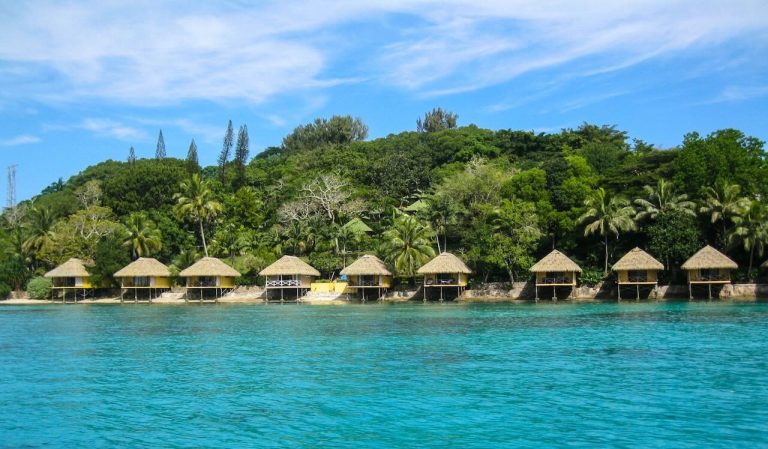
The Voice of America claimed in the article “Big Polluters and Small Island Countries Conflict on Climate Change” that climate change threatens the survival of Pacific island countries due to rising sea levels, and other countries should compensate. For example, the United States. [emphasis, links added]
This statement is wrong and lacks any scientific basis.
The data refutes any claims by island nations that they are losing land to rising sea levels.
Voice of America stated:
Nearly 100 countries and more than a dozen intergovernmental organizations will give evidence in the two-week legal process, which begins on Monday and ends on December 13.
…
The judge's opinion is advisory and not legally binding.
Recent proceedings at the International Court of Justice (ICJ) have thrust into the spotlight the claims of small island states who claim that rising sea levels due to climate change threaten their existence.
These countries seek to hold major polluters legally responsible for the alleged damage. However, closer examination of scientific evidence and observable reality challenges the basis for these claims.
Many Pacific islands are atolls – rings of coral reefs surrounding lagoons. Contrary to the narrative of inevitable sinking, Atolls have demonstrated an extraordinary ability to adapt to changes in sea level.
Research shows that these landforms can grow and adjust in response to environmental changes. A study published in nature communications The study found that despite rising sea levels, 88.6% of Tuvalu's islands have remained stable or increased in size in recent decades.
The New York Times (NYT) recently published an article titled “A Surprising Climate Discovery,” explaining that island nations such as Kiribati, the Maldives, the Marshall Islands, Tuvalu, and Vanuatu are not actually facing sinking Danger. Oceans due to climate change.
This is true; a fact is climate realism It has been discussed many times. Atolls have been known to grow as water levels rise for years, if not decades.
Climate Overview: Islands and Sea Level Rise also confirmed the fact that Tuvalu, in particular, tends to be the poster child for islands said to be threatened by sea level rise, noting “Eight of Tuvalu's nine large coral atolls have expanded in area in recent decades, as have 75 percent of Tuvalu's 101 smaller coral atolls.”
This expansion is caused by the natural process of accumulation of coral debris and sediment, allowing the atoll to maintain its land area. In short, there is no scientific basis for the idea that the islands will inevitably sink.
Another argument raised in court was the concept of “climate refugees” from sinking islands, a concept often invoked in discussions about the effects of climate change.
However, There are apparently no documented cases of populations being displaced solely by rising sea levels.
For example, despite concerns, people in Tuvalu were not forced to evacuate a lot ofrather, its population and that of other similarly situated island nations grew. When migration occurs in these islands, it is driven by economic opportunity rather than environmental factors.
Contrary to depictions of Pacific island nations on the verge of disappearing, many are actively investing in infrastructure to promote tourism—an industry incompatible with the concept of imminent submergence.
The absence of climate refugees and the aggressive expansion of tourism infrastructure further challenges claims of imminent existential threats.
For example, Fiji has experienced a tourism boom, resulting in the development of new resorts and the expansion of existing resorts. InterContinental Hotels Group is expanding its presence in Fiji with new projects in areas such as Nadi, the Islands and Suva.
Likewise, other Pacific countries such as Kiribati are strengthening their tourism infrastructure, such as building hotels and improving airports, signaling confidence in their long-term viability.
This trend suggests that these countries are unaware of the existential threat posed by rising sea levels, as such investments would be imprudent if they were about to be inundated by rising sea levels.
Holding so-called polluters legally responsible for the alleged impacts of climate change on small island nations is legally untenable. Climate change is not harming the islands, which is an essential part of any legal claim.
also, The United States argued at an ICJ hearing that international human rights law does not oblige states to reduce greenhouse gas emissions or provide for a human right to a healthy environment.
This position highlights the challenge of attributing specific environmental changes to the actions of states, given the multifaceted nature of climate dynamics.
Small island nations’ concerns about climate change appear to be more about extracting money from rich countriesas scientific evidence shows, many Pacific atolls have not only survived, but adapted and evolved.
The absence of climate refugees and the aggressive expansion of tourism infrastructure further challenges claims of imminent existential threats.
The basis for legal action against developed countries therefore appears to be fragile, as The alleged harm lacks a clear and direct causal relationship with his actions.
Given these facts, the lawsuit being pushed appears to be little more than legal extortion using alarmist narratives of rising sea levels caused by climate change to win a case that actually has no factual or legal basis.
Even if the case is decided in favor of the island country, They are unable to enforce “advisory” rulings against other countries, rendering the results essentially meaningless.
Popular photo on Unsplash by Monika MG
Read more Climate Realism
